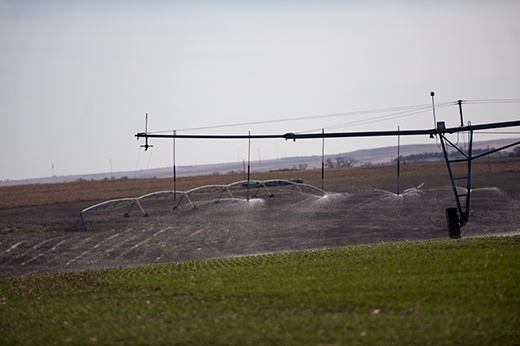Interdisciplinary team awarded $2.9 million NSF Research Traineeship grant to strengthen rural communities
Monday, Sept. 10, 2018

Conservation of the Ogallala Aquifer in western Kansas is one of the challenges that graduate students will research with the help of the first National Science Foundation Research Traineeship grant awarded in Kansas. The five-year, $2.9 million project is led by an interdisciplinary team from Kansas State University. | Download this photo.
MANHATTAN — Water shortages and their accompanying threats to the agricultural economy aren't new to Kansas, but a fresh approach to training graduate students at Kansas State University aims to adopt innovations that will protect rural communities.
Melanie Derby, assistant professor of mechanical and nuclear engineering and Hal and Mary Siegele professor of engineering at Kansas State University, will lead an interdisciplinary team that has been awarded a five-year, $2.9 million National Science Foundation Research Traineeship Program, or NSF NRT, grant to train graduate students who can address these complex challenges. The award was one of 17 NRT projects funded nationwide and is the first NRT awarded in the state of Kansas.
Derby will help meet these challenges by training students to work at the nexus of several disciplines.
"The whole goal of interdisciplinary research is that someone else's perspective makes both your work stronger," Derby said. "We do fundamental engineering work, but we want it to go to the field. We need to know how to make that happen. One of our goals is to help western Kansas and other semi-arid communities to be resilient in the future. We need all the components — engineering, agricultural economics, sociology, and more — to solve these important challenges."
Derby and her colleagues will mentor graduate students as they conduct fundamental research in three areas of the crucial food-energy-water system: conservation of and producer relationships with the Ogallala aquifer, soil-water-microbial systems, and technologies to transform animal waste into energy and water. They also will work to understand engineering, economic and socio-cultural barriers to implementation of emerging innovations.
Building communication skills and a common vocabulary across disciplines is a crucial aspect of the training. Students will engage with policymakers and attend state legislative sessions in Topeka, plus they will spend time at the Southwest Research-Extension Center in Garden City to research smart water technologies and meet with farmers and others whose livelihoods depend on conserving the aquifer and other resources.
Matt Sanderson, co-principal investigator and the Randall C. Hill distinguished professor of sociology, anthropology and social work in the College of Arts and Sciences, said people in many rural Kansas communities are beginning to think of the end of their ways of life.
"They face many problems, from soil erosion, groundwater depletion and water pollution to the loss of population, youth out-migration, growing elderly populations, loss of businesses and declining economic diversity," Sanderson said. "These are not new problems, but the challenge has been how to address them."
Sanderson said that exploring social contexts and helping students think beyond their fields of specialization will encourage new kinds of problem-solving.
"This program holds promise to identify some of the best and brightest new minds and bring them together to work on new ways of seeing, thinking and doing," he said.
"It's an integrated training experience," Derby said. "Students on the engineering side will understand socioeconomics and vice versa."
Charles Taber, Kansas State University provost and executive vice president, said the program Derby and her team have designed is consistent with the land-grant mission of attaining excellence in teaching, research and outreach.
“Sustaining the health of rural communities, the Ogallala aquifer, and the food-energy-water system is mission-critical for Kansas," Taber said. "I look forward to hearing about the achievements of these students as they apply their work and strengthen ties to the communities our university serves."
Carol Shanklin, dean of the Kansas State University Graduate School, said the NRT program helps remove institutional barriers to graduate education and requires graduate students and their mentors to explore complex societal problems from multiple perspectives.
"Top-notch STEM students who participate in this program will receive well-rounded graduate education and develop skills that will prepare them for diverse career opportunities and engage in work that will assist our state and region in addressing the complex problems in the food-energy-water system," Shanklin said.
In addition to Derby and Sanderson, the team includes co-investigators Jonathan Aguilar from biological and agricultural engineering and K-State Research and Extension, Prathap Parameswaran from civil engineering, and David Steward, currently in the civil and environmental engineering department at North Dakota State University; educational lead Gaea Hock from communications and agricultural education; and advisors Nathan Hendricks from agricultural economics, Stacy Hutchinson from biological and agricultural engineering, and Ryan Hansen from chemical engineering. The program will train 50 master's and doctoral students, including 25 funded trainees from the colleges of Engineering, Arts and Sciences, and Agriculture.
